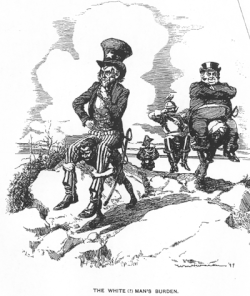This short manifesto by Lewis is literally just him saying "blast" and then naming something he dislikes. Which seems to be pretty much everything. He says "Curse" and "Blast" to so many different things, that an argument is hard to come by in this short reading. However, there is one thing he does not "blast", and that is the "Real". He says to blast the arch enemy of the real, implying that he favors the real.
This would show that he only hates these things because none of them are "real". This was written near the start of WWI, and by this time the War was inevitable. This manifesto seems to be saying that America should be only focused on this war at hand and forget and block out absolutely everything else, that will not help them win the war.
Why is this written in such a strange fashion?
Monday, April 30, 2012
Wednesday, April 11, 2012
"The White Man's Burden", Kipling
This poem is a white man that is telling his "fellow white people" to take up the white man's burden. As he talks about what the white people should do, he seems like he is saying that they need to make the other people of the world live better. The second to last stanza says "Ye dare not stoop to less-- Nor call too loud on Freedom" It talks about making th eother people free and not stooping to less, or in other words, do not live like the other nations and peoples live.
This poem seems to be about the belief of imperialism. It talks to the white men, telling them to go out into the world and conquer other peoples and "train" them in the white man's ways. The end of the first stanza is "Your new-caught. sullen peoples. Half-devil and half-child." This shows that the white men had conquered the other people, and were looking at them as savages (half-devil). This poem is cruel to the people outside America, as well as "non-whites" inside America. One thing that is not clear, is if this poem is satyrical or not. So,
is this poem satyrical or serious?
This poem seems to be about the belief of imperialism. It talks to the white men, telling them to go out into the world and conquer other peoples and "train" them in the white man's ways. The end of the first stanza is "Your new-caught. sullen peoples. Half-devil and half-child." This shows that the white men had conquered the other people, and were looking at them as savages (half-devil). This poem is cruel to the people outside America, as well as "non-whites" inside America. One thing that is not clear, is if this poem is satyrical or not. So,
is this poem satyrical or serious?
"Shooting an Elephant", Orwell
In this story the narrator is a police officer for the English that everyone hates. He is jeered at and tripped by people (in soccer), and is very angry with how people treat him. He hates hits job and doesn't even know why he does it anymore. One day, he receives reports of a wild elephant rampaging through the town. So he takes a rifle which he knows is not strong enough to kill the elephant, and goes. He cannot find the elephant and everyone has a different story. He does not even believe the reports until he sees a mangled body left by the elephant. Eventually they find the elephant, and it looks calm so he does not wish to shoot it. However, the people followed him and are eagerly awaiting him to shoot it. He does shoot and eventually kill it solely not to look foolish.
This story seems to be highly symbolic of World War II. Specifically with the elephant and the police officer. The elephant seems to represent Germany to some extent, and the police officer seems to represent the American government. When the elephant is angry it takes and does whatever it wants, and no one had the ability to stop it. The officer thinking to himself that his gun would never kill an elephant seems to represent the idea of how weak the American army was compared to Germany's. Also, when the man shoots the elephant, it is solely for the crowd's appeasement, which may have been somewhat true in the real case. Finally, at the end of the story, the officer says that he is glad that the man was killed, because it put him on the legally "right" side of the conflict. This is a statement that America did not truly care for the children and men and women in the Holocaust, but instead used them as their excuse for attacking Germany.
What is Orwell's stance on WWII?
Monday, April 9, 2012
"The Communist Manifesto", Marx and Engels
One major problem with the communist system is that there would be little to no initiative. In a capitalist society, many inventions and accomplishments are based on the fact that people know they will get money for what they have done, and possibly a significant amount. In the communist system people will never get any more or less for what they do, so Scientists, engineers, doctors, and everyone else as well may not care to make or do anything spectacular, because they will receive nothing more than usual.
What is the difference betweeen Socialism and Communism?
Monday, April 2, 2012
A Man Said to the Universe
This very short poem by Stephen crane isn't much to summarize, however it is a confusing poem at first glance and can be analysed deeply. This poem is literally only 5 short lines, and they seem to make no sense. A man has a conversation with the universe, in which he tells it that he exists. The universe tells the man that that fact has not given the universe any obligation to the man.
This poem connects to the idea of Deism, in which God is the divine "Watch-maker", and he made creation and is now simply allowing it to run its course. This is shown through several points. One, when the man tells the universe he exists, he says "sir". This shows that he is talking to someone, not the universe as a whole, and the universe seems to represent God. After the man says this, the God answers him by saying "However, the fact has not created in me a sense of Obligation." This means that this presence has no obligation to look after or "care" for the man. A Deist believes that God is no longer with creation, but there was a God who created it all.
This poem connects to the idea of Deism, in which God is the divine "Watch-maker", and he made creation and is now simply allowing it to run its course. This is shown through several points. One, when the man tells the universe he exists, he says "sir". This shows that he is talking to someone, not the universe as a whole, and the universe seems to represent God. After the man says this, the God answers him by saying "However, the fact has not created in me a sense of Obligation." This means that this presence has no obligation to look after or "care" for the man. A Deist believes that God is no longer with creation, but there was a God who created it all.
If this analysis is true, the wouldn't God not have answered at all?
Sunday, March 18, 2012
The Yellow Wallpaper, by Gilman
In this short story, the narrator is a woman who's husband is very cruel to her and manages everything that she does. He does not allow her to do most anything. He locks the woman in a room, and in that room there is nothing other than the yellow wallpaper on the walls. As the story goes on, the woman seems to become more and more insane. She talks of the yellow wallpaper in ways that show her fascination with it. In the end of the story she imagines that there are other women like her crawling around in the wallpaper, and she even comes to the conclusion that she is one of them. At the end, she will not leave the room when she is supposed to leave.
This story shows how the women of this time period were treated. The husband believes that his wife is going through a sort of temporary depression, so he doesn't allow her to do anything. He puts her in this room and she even has to hide her journal from him. She descends into insanity, due to the lack of things to do or even think about. It shows that the men of this era were cruel to the woman and caused more harm than they did help.
Why would the husband think that things like not seeing her child would help her with her depression?
Wednesday, March 14, 2012
"Criticism and Fiction" by Howells
In this excerpt from "Criticism and Fiction", Howells talks about the writing of realists, and also about Jane Austen. He talks of some of the criticism her writing and writings like it have taken, but he says that realistic writings of nature are beautiful, and that fictional writings should be criticized instead. He talks about how the writers thought that they were better than the realist writings for using the characters in certain ways to do certain things, but he believes that it is harder to write a realistic story, and if it is done, then the story will be much better. He says that he has started to see a recovery in England from all the fictional writing that has happened.
One thing he says is that the men have been trained to think that whatever they like is good, and no longer to think in the opposite order (in that we no longer like what is good, we say it is good because we like it). This relates to us still today. People will be offended, shocked, and etc if you don't appreciate what they like. People expect other people to like what they like and dislike what they dislike, not to like what is good and dislike what is bad.
Why is fictional writing "bad"?
One thing he says is that the men have been trained to think that whatever they like is good, and no longer to think in the opposite order (in that we no longer like what is good, we say it is good because we like it). This relates to us still today. People will be offended, shocked, and etc if you don't appreciate what they like. People expect other people to like what they like and dislike what they dislike, not to like what is good and dislike what is bad.
Why is fictional writing "bad"?
Wednesday, March 7, 2012
"Liking is for Cowards, Go for What Hurts." Jon Franzen
This essay is about the possible threat that technology poses on true love. Franzen seems to believe that technology is changing our view of, thoughts about, and even love itself. He talks about how technology is so fast now-a-days and how people can get what they want immediately. He brings up the idea of "the next big thing", meaning that even if one piece of technology is sufficient , if another comes out that seems more advanced, many people will buy it because it is more appealing. This goes against love, because it shows people trying to find the perfect match, but there truly is no such thing as a perfect match. If people begin to treat love the same as technology, then love will be in danger at all times.
I do not believe that what Franzen is arguing is correct. Things that come from technology may be harmful to love, but not the technology itself. However, people do not treat their loved ones the way he describes in this article. He talks about how we just toss aside old phones in this day for a newer and better one. However, people now-a-days do that no more than they did many years ago, if not less. People may find someone better, and go with them, but it is not as common as with phones.
How exactly does the title relate to his argument?
I do not believe that what Franzen is arguing is correct. Things that come from technology may be harmful to love, but not the technology itself. However, people do not treat their loved ones the way he describes in this article. He talks about how we just toss aside old phones in this day for a newer and better one. However, people now-a-days do that no more than they did many years ago, if not less. People may find someone better, and go with them, but it is not as common as with phones.
How exactly does the title relate to his argument?
Sunday, March 4, 2012
"Get Smarter", Jamais Cascio
In this article, Jamais Cascio is arguing his belief that people are actually getting smarter due to modern technology, as opposed to Carr's belief that technology is making us stupid. Cascio talks about the process of intelligence augmentation, which is the adaptation of people to modern technology as it gets faster and more advanced. He describes this process as almost a form of evolution. He also believes that the media is making us smarter, because it is giving us the ability to think quickly enough to suddenly change topics and stay highly focused on each topic.
Jamais Cascio's belief that technology is making us smarter instead of less intelligent seems more plausible than the idea that it is making us stupid. Being able to change topics rapidly shows the speed of the mind, and that we are able to think through things quickly. If you look at people today, the people who have the most trouble with technology are older people. A child learns quickly, while an old man may never understand how to check a computer. This is because the child's brain is less developed and can "adapt" to the use of a computer, while an old person cannot easily adapt.
Is this essay a direct response to "Is Google Making Us Stupid?"?
Jamais Cascio's belief that technology is making us smarter instead of less intelligent seems more plausible than the idea that it is making us stupid. Being able to change topics rapidly shows the speed of the mind, and that we are able to think through things quickly. If you look at people today, the people who have the most trouble with technology are older people. A child learns quickly, while an old man may never understand how to check a computer. This is because the child's brain is less developed and can "adapt" to the use of a computer, while an old person cannot easily adapt.
Is this essay a direct response to "Is Google Making Us Stupid?"?
Wednesday, February 29, 2012
"Is Google Making Us Stupid?" Nicholas Carr
In this essay, Nicholas Carr writes about his belief that Google (as well as other technology) is in reality, hurting us. With Google, we have the availability to "google" anything that we need to know, instantly. With this capability, we do not need to put as much stress on remembering anything, because if you forget, simply google it again. Carr mentions that he has noticed a lack of focus while he reads, and he believes that the internet has created that habit. He talks about how its easier to simply read to only find the main idea instead of actual reading the entirety of some article or other literature for better understanding. Carr talks about how technology has gotten rid of much of the writing that we do. This is a problem because writing is actually a very efficient way of learning something. Writing something down helps you remember it easier.
Google is not necessarily making us stupid. We get distracted while on the internet and by other technology, however it is a choice to focus on something else. Technology can and often does cause distraction. The ads, videos, links, and all the different ways to navigate around the internet, so our attention is jerked around from place to place, rapidly and chaotically. I have found myself watching viral videos when I actually logged on the this blog and was about to write. I googled the title of one our the essays we read to get a picture, when I searched, it took me to a list of websites, the first being a video with the title of the essay. So I clicked on it, and followed related links and etc, I soon was entirely off topic and had forgotten about the assignment. So while it is true that Google is effecting us negatively, I do not agree with the idea that it makes us stupid. Google seems to simply shorten our attention spans, which can have effects in it of itself.
When Carr says "stupid" does he mean unintelligent? or simply that we do not focus or work as much?
Google is not necessarily making us stupid. We get distracted while on the internet and by other technology, however it is a choice to focus on something else. Technology can and often does cause distraction. The ads, videos, links, and all the different ways to navigate around the internet, so our attention is jerked around from place to place, rapidly and chaotically. I have found myself watching viral videos when I actually logged on the this blog and was about to write. I googled the title of one our the essays we read to get a picture, when I searched, it took me to a list of websites, the first being a video with the title of the essay. So I clicked on it, and followed related links and etc, I soon was entirely off topic and had forgotten about the assignment. So while it is true that Google is effecting us negatively, I do not agree with the idea that it makes us stupid. Google seems to simply shorten our attention spans, which can have effects in it of itself.
When Carr says "stupid" does he mean unintelligent? or simply that we do not focus or work as much?
Wednesday, February 22, 2012
Emerson: Self Reliance
In this writing by Emerson, he states that a genius is someone who believes their own thoughts, and what they know is true in their hearts. Not just what is accepted by all and other people. He states that a genius can come in many different "forms", not just the famous geniuses that everyone knows. Emerson talks about self worth as well. He says that all men have the responsibility to think for themselves and lean on their own beliefs and thoughts.
Emerson's saying that a genius can come in many different forms reminds me of the quote from Albert Einstein. He says "Everyone's a genius, but if you judge a fish on its ability to climb a tree it will live its whole life thinking it is stupid." This relates directly to what Emerson is saying and shows that just because you aren't a math or science genius, does not mean you aren't a genius in some other way.
What does Emerson mean by "trifles" when he talks about societal disapproval?
Emerson's saying that a genius can come in many different forms reminds me of the quote from Albert Einstein. He says "Everyone's a genius, but if you judge a fish on its ability to climb a tree it will live its whole life thinking it is stupid." This relates directly to what Emerson is saying and shows that just because you aren't a math or science genius, does not mean you aren't a genius in some other way.
What does Emerson mean by "trifles" when he talks about societal disapproval?
Hawthorne: "The Ministers Black Veil"
In this short story, the pastor, Reverand Hooper, is the head of a church. Hooper one day shows up to church on sunday with a black veil covering his face. Other than the black veil, he is entirely normal to a typical day. His sermon has the same characteristics as always, and he is dressed clean and sharp. Even though he is normal besides the veil, his congregation only focuses on the veil itself. Some are scared, some scoff, and some are just bothered. The entire town talks about this black veil that he wears everywhere, even to weddings and funerals. He is still himself at these "events" but everyone still is concerned with the veil. The pastor wears this veil his entire life, and is even eventually buried in his tomb, with it still upon his face.
In the story, pastor Hooper goes to a beloved girl's funeral. He wears his black veil to the funeral and proceeds to do the funeral as normal. During the funeral, he bends down to the girl, and his veil hangs out from his face, so that his face is revealed to the corpse's face. The story says "if her eyelids had not been closed forever, the dead maiden may have seen his face". This could be an exaggeration on the people of his church. The pastor's face was able to be seen by the girl, but her eyes were closed forever. This shows that the pastor never changed, the veil was the only difference, and his the people of the church would have simply opened up there eyes to this, they would have seen the same old pator Hooper that they were all now afraid of.
At the end of the story, is he buried while he is still alive? That section of the reading is confusing.
In the story, pastor Hooper goes to a beloved girl's funeral. He wears his black veil to the funeral and proceeds to do the funeral as normal. During the funeral, he bends down to the girl, and his veil hangs out from his face, so that his face is revealed to the corpse's face. The story says "if her eyelids had not been closed forever, the dead maiden may have seen his face". This could be an exaggeration on the people of his church. The pastor's face was able to be seen by the girl, but her eyes were closed forever. This shows that the pastor never changed, the veil was the only difference, and his the people of the church would have simply opened up there eyes to this, they would have seen the same old pator Hooper that they were all now afraid of.
At the end of the story, is he buried while he is still alive? That section of the reading is confusing.
Wednesday, February 15, 2012
Song to Myself, Whitman
This poem is simply about a thirty seven year old man, celebrating himself. He notes that he is from the soil, as well as everyone else. He came from his parents, who came from their parents, and so on. When the narrator does say that he is from the soil, he states that his tongue, and every atom of his blood came from the soil and air.
The fact that the narrator said that his tongue came from the soil is important. He does not say his heart, skin, eyes, or any other organ. He only says his tongue and his blood. Blood is one of the most basic necessities of all living creatures. Every single animal has blood. Many animals also do have tongues, however, it seems that when he says his tongue is from the soil, he means his ability to speak. This incredible phenomenon called talking is a very advanced form of communication, however no matter how advanced something is, it still came from nature, and it will never escape the fact that it is from nature. The brain, and the power to think logically is also from nature, even though it is arguably the most advanced quality we have.
Is this why the author mentioned only his tongue and his blood were made by the soil?
The fact that the narrator said that his tongue came from the soil is important. He does not say his heart, skin, eyes, or any other organ. He only says his tongue and his blood. Blood is one of the most basic necessities of all living creatures. Every single animal has blood. Many animals also do have tongues, however, it seems that when he says his tongue is from the soil, he means his ability to speak. This incredible phenomenon called talking is a very advanced form of communication, however no matter how advanced something is, it still came from nature, and it will never escape the fact that it is from nature. The brain, and the power to think logically is also from nature, even though it is arguably the most advanced quality we have.
Is this why the author mentioned only his tongue and his blood were made by the soil?
The Wound Dresser, by Whitman
In this poem by Walt Whitman, the narrator is a wound dresser, that is doing his work after a battle that took place. This man has a realization while he is working on these men, and it makes him change his mind about the war. At first, he wanted to wage this war, he was almost excited about it. However, after seeing these men injured and hurt, he changes his mind about this. He sees the suffering these men are going through and decides that he does not think this war is worth it. He also states that in both sides of this war the fighters are brave, and on both they are dying.
In the poem the wound dresser thinks to himself, that he wants their death to come. He says "In mercy come quickly" meaning that the faster their death comes, the better. This is because these men and boys are suffering so terribly that it would be more peaceful and humane for them to simply die. They are in agony and he also says that he would die for them if he could in order to save them. This is touching in the way that it reminds one that doctors do in fact care about their patients. We're not just numbers to them, we matter. They want to see us live and they hate to see us suffer.
This poem is very descriptive, so i would like to know, is this poem entirely made up, or an actual memory from Whitman?
In the poem the wound dresser thinks to himself, that he wants their death to come. He says "In mercy come quickly" meaning that the faster their death comes, the better. This is because these men and boys are suffering so terribly that it would be more peaceful and humane for them to simply die. They are in agony and he also says that he would die for them if he could in order to save them. This is touching in the way that it reminds one that doctors do in fact care about their patients. We're not just numbers to them, we matter. They want to see us live and they hate to see us suffer.
This poem is very descriptive, so i would like to know, is this poem entirely made up, or an actual memory from Whitman?
Friday, January 27, 2012
"Tell-Tale Heart" by Poe
This story is written by a man that is trying to argue for his sanity. He says that people accuse him of being "mad", or insane, while he believes that this "madness" is truly just a keen sense of hearing. This man tells a story of how he killed his neighbor. He says that he killed his neighbor even though he loved the old man, the only part of the man he disliked was his eye. The old man had the eye of a vulture, and it inexplicably infuriated the narrator. The story goes into how he killed the man in great depth, to the point where it feels repetitive and unnecessary. When the man was killed, he let out a shriek, which someone heard and reported to the police, who then come and the narrator leads them around the entire house, where they find nothing. Eventually, they sit in the room where the body is hidden (under the floorboards) to rest. They stay here for a long time and talk. As they sit, the narrator begins to hear a ringing sound, that gets louder as he waits. Eventually, he can no longer bear the noise, so he rips up the floorboards t reveal the body and be taken away for the crime.
This story is about guilt. The narrator is at first happy and even proud of his deed. However, the guilt, shown by the ringing sound, gets worse and worse. Eventually, the ringing makes him confess so that he can be taken away from it. This shows that the narrator would rather suffer for the evil that he has committed than deal with the terrible guilt for the rest of his life.
What event would lead Edgar Allen Poe to write this? Or did he simply write this for the simple reason of enjoyment?
Tuesday, January 24, 2012
"The Raven" by Poe
In the beginning of this poem, Poe is thinking deeply and woefully about his loved one, Lenore. When he hears a noise on the door, he checks and no one is there. Soon after, he hears a tapping on the window as well, and when he checks, he finds a raven perched upon a branch close to his window. He likes this raven, and asks it what its name is, its reply is "nevermore". Poe talks to the bird and asks him several questions, however the bird always answers "nevermore". Poe tells the bird to leave after receiving no help with his many questions and need for advice, but the bird stays where it is.
The answer "nevermore" is clearly a very important and meaning part of this poem. However, Poe did not make the title of the poem "nevermore" instead he named it "The Raven", which would indicate that the raven Poe talks with is of at least equal if not greater meaning to the poem. One possible idea is that the raven itself represents the Lord, and when Poe continually asks the raven about the woman, it simply says "nevermore" over and over. This could mean that when people sin, and ask God for advice, he simply tells them to do it no longer, nevermore. Some people love the sin they commit too much to turn from it, and become angry with the Lord and no longer want his help in their lives. However, one major possible flaw could ruin this idea, which leads me to this question:
Was Edgar Allan Poe a Christian?
Tuesday, January 3, 2012
Irving's "Rip Van Winkle"
This story is about a man, who is adored by many people. He was loved by many women, and the children all like to play with him. His life outside of his house is perfect, however, he and his wife are on the verge of divorce, his father was cruel to him, and he was not a good farmer. He only loved his dog. One day, he went up on a mountain to take his own life, but people showed up and he drank with them until he passed out. When he woke up, his dog was gone. He went back to town to find that he was actually asleep for 20 years, and everyone he knew was gone. He had to start a new life.
This story can relate to alcoholism very well. This man was depressed, and in his depression he took a drink of alcohol, but didn't stop, he drank more and more. He eventually passed out and slept for twenty years, in a completely different life. This symbolizes how alcohol can dominate your life, and can for many years, and that when you finally stop, you may have already ruined or changed everything and may have a completely new life, or even have to start all over.
Is that what Irving was trying to show?
This story can relate to alcoholism very well. This man was depressed, and in his depression he took a drink of alcohol, but didn't stop, he drank more and more. He eventually passed out and slept for twenty years, in a completely different life. This symbolizes how alcohol can dominate your life, and can for many years, and that when you finally stop, you may have already ruined or changed everything and may have a completely new life, or even have to start all over.
Is that what Irving was trying to show?
Subscribe to:
Posts (Atom)
















